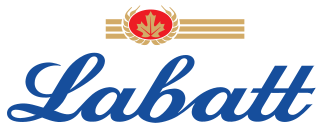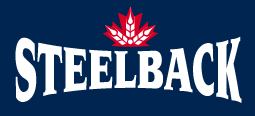
Foster's Lager is an internationally distributed brand of Australian lager. It is owned by the Japanese brewing group Asahi Group Holdings, and is brewed under licence in a number of countries, including its biggest market, the UK, where the European rights to the brand are owned by Heineken International.

Labatt Brewing Company Limited is a Anheuser-Busch InBev-owned brewery headquartered in Toronto, Ontario, Canada. Founded in 1847, Labatt is the largest brewer in Canada.

Sleeman Breweries is a Japanese-owned Canadian brewery founded by John Warren Sleeman in 1988 in Guelph, Ontario. The company is the third-largest brewing company in Canada. Along with its own Sleeman brands, the company produces under licence the Stroh's family of brands, Maclays Ale and Sapporo Premium beers for sale in Canada. The company's parent Sapporo owns 4.2 per cent of Ontario's primary beer retailer The Beer Store.

Beer was introduced to Canada by European settlers in the seventeenth century. The first commercial brewery was La Brasseries du Roy started by New France Intendant Jean Talon, in Québec City in 1668. Many commercial brewers thrived until prohibition in Canada. The provincial and federal governments' attempt to eliminate "intoxicating" beverages led to the closing of nearly three quarters of breweries between 1878 and 1928. It was only in the second half of the twentieth century that a significant number of new breweries opened up. The Canadian beer industry now plays an important role in Canadian identity, although globalization of the brewing industry has seen the major players in Canada acquired by or merged with foreign companies, notably its three largest beer producers: Labatt, Molson and Sleeman. The result is that Moosehead, with an estimated 3.8 percent share of the domestic market in 2016, has become the largest fully Canadian-owned brewer.

Kokanee is a beer brewed at the Columbia Brewery in Creston, British Columbia. Columbia Brewery began brewing Kokanee lager in 1959 and was purchased by the Labatt Brewing Company in 1974.
Old Milwaukee is a brand of American dry lager owned by the Pabst Brewing Company and consists of four different brews—Old Milwaukee Lager, Old Milwaukee Light, Old Milwaukee Non-Alcoholic, and Old Milwaukee Ice. Old Milwaukee is brewed throughout the USA and various packages are currently distributed in all 50 US states, many Canadian provinces, and in select international markets.

Mill Street Brewery is a brewery in Toronto, Ontario, Canada that is a part of Anheuser–Busch InBev and named after Mill Street where it is located. During its first decade of operation, as an independent brewer, Mill Street won several awards including Golden Tap Awards for Best Toronto Microbrewery ('04-'08) and Best Toronto Beer, and was named "Canadian Brewery of the Year" at the Canadian Brewing Awards in 2007, 2008, and 2009. It was purchased in 2015 by Canadian brewer Labatt Brewing Company, which in turn is owned by the global brewing giant Anheuser–Busch InBev.
John Labatt was a Canadian businessman and brewer. Labatt took charge of Labatt Brewing Company, formally known as Labatt and Company, after his father's death in 1866. Labatt helped Labatt Brewing Company eventually become the largest brewery in Canada.

Oriental Brewery or OB is a South Korean brewery currently owned by AB InBev, and initially founded by Doosan Group.

Steelback Brewery was a Canadian brewery located in Tiverton, Ontario, on the shores of Lake Huron.

Wellington Street is a Lower City arterial road in Hamilton, Ontario, Canada. It starts off at Charlton Avenue East as a two-way street for only one block where it's then blocked off by the Corktown Park and a couple of Canadian National Railway lines that cut through it. It then starts up again north of the park on Young Street and is a one-way street the rest of the way (Southbound). It ends in the North End of the City on Burlington Street East, in front of the Lakeport Brewing Company and the Administration offices of the Hamilton Port Authority.
Anheuser-Busch InBev SA/NV is the largest beer company in the world. It had 200 brands prior to the merger with SABMiller on October 10, 2016. The combined ABInBev/SAB Miller entity has approximately 400 beer brands as of January 2017.

Canadian Breweries Limited (CBL), originally the Brewing Corporation of Ontario, was an Ontario-based holding company in the brewing industry. The company was founded in 1930 by a merger of two breweries, Brading of Ottawa and Kuntz of Kitchener-Waterloo. Under the direction of its top executive, E. P. Taylor, the company bought or merged many of the smaller competitors existing after the repeal of prohibition. The new company closed many plants, reduced the number of beer brands and built new, larger plants to produce enough beer for a much larger geographic area. By the 1950s, the company had reduced the number of beer brands from approximately one hundred to six. Canadian Breweries became part of a large conglomerate of manufacturing and consumer businesses controlled by the Argus Corporation in 1945.
Anheuser-Busch InBev SA/NV, commonly known as AB InBev, is a Belgian multinational drink and brewing company based in Leuven, Belgium and is the largest brewer in the world. Additionally, AB InBev has a global functional management office in New York City, and regional headquarters in São Paulo, London, St. Louis, Mexico City, Bremen, Johannesburg, and others. It has approximately 630 beer brands in 150 countries.
InBev was a brewing company that resulted from the merger between Belgium-based company Interbrew and Brazilian brewer AmBev which took place in 2004. It existed independently until the acquisition of Anheuser-Busch in 2008, which formed Anheuser-Busch InBev. InBev had operations in over 30 countries and sales in over 130 countries. In 2006, it had a market capitalization of €30.6 billion and net profit of €3.2 billion on sales of €13.3 billion.
FIFCO USA is an American brewing company based in Rochester, New York.

American lager or North American lager is pale lager that is produced in the United States. The pale lager-style beer originated in Europe in the mid-19th century, and moved to the US with German immigrants. As a general trend outside of Bavaria and the Czech Republic where the beers may be firmly hopped, pale lager developed as a modestly hopped beer, and sometimes used adjuncts such as rice or corn – and this was also true in the US.
The Ontario Craft Brewers (OCB) is a trade association representing 83 small, independent breweries in the Canadian province of Ontario.

Manjit Minhas is a Canadian entrepreneur, television personality and venture capitalist. She is co-owner of Minhas Breweries & Distillery, manufacturer of beer brands such as Mountain Crest Classic Lager, Boxer Lager, Lazy Mutt Ale and Huber Bock. She specializes in marketing with interests in branding and sales. Minhas was announced as one of the new dragons on Season 10 of the Canadian reality television series Dragons' Den in 2015 for its tenth season. According to the Dragons Den website she has "been recognized for several business industry awards such as PROFIT magazine's "Top Growth Entrepreneur", Top 100 Women Entrepreneurs in Canada, Canada's Top 40 under 40, Chatelaine Magazine's "Top Entrepreneur Woman of The Year 2011", Ernst and Young's Entrepreneur of The Year Prairie Region and The Sikh Centennial Foundation Award 2015." Minhas's philanthropic causes include The United Way, which she co-chaired in 2017 and an engineering school for girls in India. Minhas joined the ATB Financial Board of Directors in 2017 and is on both the Governance and Conduct Review, and the Human Resources Committees. She joined the Calgary Airport Authority Board of Directors in 2020.
Hard soda, also referred to as flavored beer, adult soda, fermented soda, mature soda and alcohol soda, is a type of alcoholic beverage and craft beer that is manufactured in the style of a soft drink. It has gained recent prominence in the United States after the success of the Not Your Father's Root Beer brand manufactured by Small Town Brewery. As of late May 2016, at least 39 hard soda brands exist in the United States.












